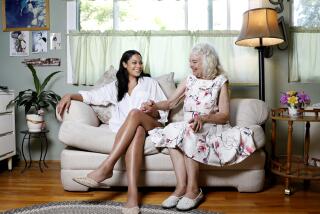BOOK REVIEW : Relationships Slide into Generation Gap : THE MEN AND THE GIRLS <i> by Joanna Trollope</i> , Random House, $30, 248 pages
- Share via
Though the author is a descendant of Anthony Trollope and has written historical novels, “The Men and the Girls” is a brisk, thoroughly contemporary story of relationships between a pair of 60ish men and the young women with whom they live.
As the book begins, these connections are beginning to show some signs of wear and tear. The generation gap, hardly noticeable when the couples met, suddenly seems to have widened. Inevitably, the developing situation turns the book into a witty and involving cautionary tale.
James Mallow and his Kate have been together ever since they met in a pub when he spilled a dollop of beer on her shoulder.
Kate was then the single mother of a 6-year-old daughter, and James had been a widower for 20 years. Happy to move into James’ house with her child and to devote herself to making him comfortable and happy, Kate has nevertheless stubbornly refused to marry him, a detail that had apparently stopped mattering in the course of time. Her determination to remain legally independent is part of Kate’s charm, as individual as her red hair and her Irish heritage.
Her daughter is now a teen-ager with punk hair and combat boots; James’ elderly and irascible uncle is living with them, and as the novel opens, James has just knocked an elderly Oxford spinster off her bicycle while driving in the rain without his spectacles. Kate has been feeling obscurely restless for a while, but the bicycle accident comes as a distinct shock. Has James become--elderly? Is this the shot over the bow, a sign that her tender and hearty lover is turning into Uncle Leonard?
Hugh Hunter, James’ friend since school days, is a well-known television commentator. A sought-after bachelor until his 50s, he fell in love with the brisk and capable production assistant on his new program and has enjoyed fatherhood and domesticity ever since. He and Julia are married and the parents of 4-year-old twin boys.
Now, however, he’s seen a few omens of his own. The day of his program has been shifted and its time allotment cut. Younger men are not only standing in line behind him, but shoving. Hugh realizes that if he’s lucky, he’ll wind up hosting a talk show in the provinces. The prospect doesn’t delight him, though he does his best to pretend it does.
The action is cross cut, offering alternate visions of James and Kate followed by scenes with Hugh and Julia, a technique that emphasizes the parallels between the two couples. The men meet for occasional private conversations, in which their mutual plight is explored further. As Hugh’s career wanes, Julia’s flourishes. A part-time journalist and full-time mother, she hires a nanny and devises a television show of her own, a change that adds to the stresses already fraying the marriage.
Kate, who had seemed content to do volunteer work at a battered women’s shelter and to help a friend in a restaurant a few days a week, meets a compellingly attractive (and young) man at the restaurant and embarks on an affair with him. Exercising her long-dormant options, she moves out of James’ house into a tiny flat near her lover. Her daughter Joss chooses to stay with James, who gradually becomes involved with the neglected mother of Joss’ American boyfriend.
Throughout, the dear old spinster, Beatrice Bachelor, becomes a force in the radical alterations taking place in the lives of James, Kate, Joss and, to a lesser but still significant extent, Hugh and Julia Hunter. Beatrice, who had seemed so vulnerable with her belongings scattered in the street and her face splashed with mud, turns from a pitiable character into a role model, but to find out how this and other transformations are wrought, read “The Men and the Girls.”
The style is altogether different, but the wry gene that made the earlier Trollope’s work a delight endures in this novel by a worthy successor.
More to Read
Sign up for our Book Club newsletter
Get the latest news, events and more from the Los Angeles Times Book Club, and help us get L.A. reading and talking.
You may occasionally receive promotional content from the Los Angeles Times.








